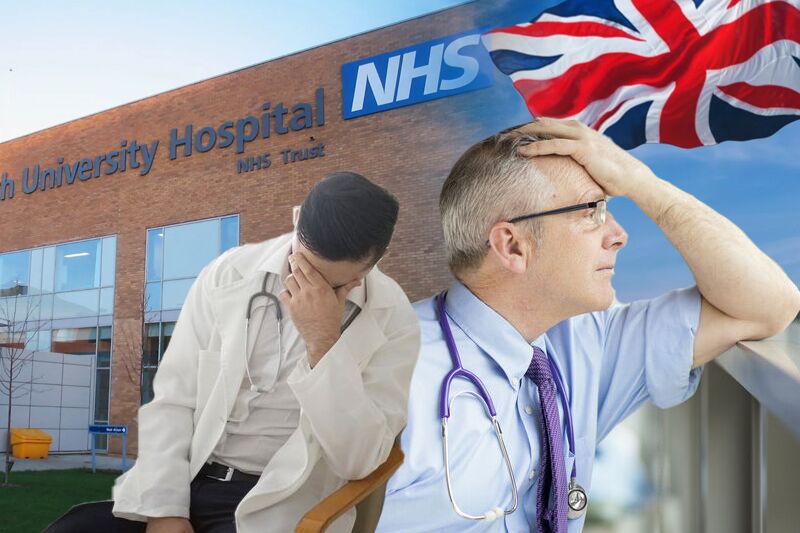
uk gps ‘most stressed’ and ‘least satisfied’, international study finds
In comparison to doctors in other nations with high incomes, GPs in the UK report the highest levels of stress and the lowest levels of job satisfaction in their jobs.
More about the international study of GPs
Data from a survey of 9,526 general practitioners (GPs) in 10 countries, including 1,010 in the UK, was examined in a Health Foundation report released today.
In comparison to doctors in nearly all other countries, UK doctors reported “higher levels of emotional distress” and “bigger increases in workload,” and many of them expressed interest in quitting medicine altogether.
The number of fully qualified, full-time equivalent general practitioners in England has decreased since 2015, according to the Health Foundation, despite numerous government commitments to increase the number of GPs.
According to the foundation, there are currently 4,200 GP shortages that could increase to 8,800 by 2031, or about 1 in 4 of the projected GP posts.
“The experience of GPs in the UK should ring alarm bells for the government,” the report stated. The majority of the 10 countries surveyed, including Germany, report having “extremely” or “very stressful” jobs at 71%. The workload, work-life balance, time spent with patients, and other aspects of GPs’ jobs in the UK are among the least satisfying.
Keep Reading
‘The NHS is not the only health system under pressure, but the experience of GPs in the UK should ring alarm bells for government,’ said Hugh Alderwick, director of policy at the Health Foundation.
The NHS is built on the foundation of general practice, but GPs are warning us clearly that these foundations are sagging.
The pandemic has had a significant impact on UK general practitioners, in addition to longer-term issues like staff shortages and increasing workload.
UK doctors were among the most satisfied in the survey a decade ago, but now they are in a tie for last place with French doctors. GPs are overworked and burned out, and many are thinking about leaving their positions.
To improve the working conditions of doctors of medicine, decisive policy action is required, including increasing GP capacity, reducing workload, and utilizing additional primary care staff.
“The Government has pledged to publish its long-delayed workforce plan for the NHS shortly, but the pledge of new doctors will be of little use if the NHS is unable to retain the ones it currently has,” the statement reads.
General practice in the UK “will become unsustainable” if urgent action is not taken, according to RCGP chair Professor Kamila Hawthorne.
This report shows what a sorry situation we are in, especially when compared to other high-income nations, she said.
The fact that GPs in the UK are among the most stressed and overworked of the nations analyzed is alarming but in no way unexpected.
“GPs and our teams want to provide safe, appropriate, and timely care for our patients, but this is becoming ever more challenging given the intense workload and workforce pressures we are working under,” the statement reads.
The pandemic left GP teams exhausted, but they also saw a 9% increase in patient consultations compared to 2019 and 843 fewer fully qualified, full-time equivalent GPs.
There will be important opportunities to address the workload and workforce pressures facing general practice with the upcoming primary care recovery plan and the eagerly anticipated NHS workforce plan.
The findings, according to Dr. Kieran Sharrock, acting chair of GPC England at the BMA, were “unfortunately unsurprising.”
“Workload in general practice has completely outgrown sustainable levels, and GPs are exhausting themselves trying to keep up with the rising patient demand,” he declared. The fact that so many of my coworkers are reporting feeling stressed and burned out really worries me. Many skilled and seasoned doctors are losing interest in their careers and feel forced to cut back on their hours or quit altogether, depriving communities of the care they require in the process. Since September 2015, we have lost the equivalent of 2,078 full-time, fully qualified general practitioners.
To address the growing GP workforce crisis and lessen the burdensome workloads on physicians, the government must take action. In the absence of this, pressures will only increase, doctors and patients will suffer, and we will eventually run out of general practices to save.
A high percentage of general practitioners (GPs) feel “well-prepared” to manage care for patients with long-term conditions and mental health needs, according to a survey that also looked at some of the “core strengths” of general practice in the UK.
Compared to most other nations, GPs in the UK are especially confident in managing patients who require palliative care (96%) and dementia (95%) needs.
The UK also excels in using electronic medical records, online service access, and data-driven care.
It’s not all bad news, said Professor Hawthorne. More GPs feel their practice is equipped with the necessary knowledge and experience to manage patients with dementia, chronic illnesses, and palliative care, and the UK is further ahead than most other nations in some areas, such as practices offering online repeat prescriptions. The report makes it abundantly clear that the foundations of general practice in the UK are sound and deserving of support.
“The vast majority of patient contact in the NHS is made by GPs and our teams, and by doing so we reduce pressures across the health service, including in A&E.”
But it does demonstrate without a doubt that we are having difficulties as the backbone of the NHS.
Labor shadow health secretary Wes Streeting said: ‘The Conservatives have cut 4,500 GPs in the past decade, so it’s no wonder doctors are overstretched and patients finding it impossible to get a GP appointment when they need one. But in his Budget, Jeremy Hunt hardly made any mention of the NHS.
To train the doctors we need, “Labour will double the number of spots available in medical schools. We’ll also reform primary care to make it future-proof and bring back the family doctor.”



